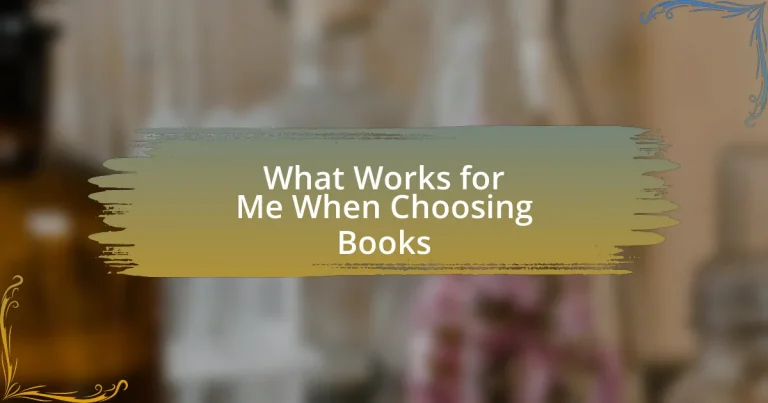Key takeaways:
- Understanding alcohol reviews is vital for making informed choices, as they reflect personal experiences and biases.
- Reading reviews provides insights that can save time, expose new brands, and foster a sense of community among readers.
- Key elements of good reviews include authenticity, context, and detailed flavor descriptions which enhance the overall understanding of the product.
- Trustworthy review sources include user-generated content on forums, expert evaluations, and genuine social media influencers.
Author: Clara Whitmore
Bio: Clara Whitmore is an acclaimed author and storyteller known for her captivating narratives and richly drawn characters. Her work spans several genres, including contemporary fiction and historical romance, often weaving elements of personal experience into her writing. Clara holds a Master’s degree in Creative Writing from the University of Edinburgh and has published three novels, which have garnered critical acclaim and a loyal readership. When she’s not writing, Clara enjoys exploring quaint bookstores and hosting literary workshops. She currently resides in Portland, Oregon, with her dog, Jasper.
Understanding alcohol reviews
Understanding alcohol reviews is essential for making informed choices. Personally, I remember the first time I ventured into a local distillery, feeling both excited and overwhelmed by the vast selection. The reviews online helped me navigate that experience—without them, I would have left with a bottle of something I didn’t truly enjoy.
Each alcohol review tells a story, often reflecting the reviewer’s own experiences and biases. Sometimes, I find myself questioning the motivations of the reviewer: Are they genuinely sharing their passion, or are they chasing trends? This reflection not only deepens my understanding but also makes the reviews feel more like a conversation rather than a transaction.
In delving into reviews, I’ve learned to pay attention not just to the ratings but to the nuances in tasting notes and personal experiences shared. There was a time when I would overlook these details, only to discover later that a subtle note of oak could transform my perception of a whiskey. Isn’t it fascinating how a few words can elevate our understanding of a drink and shape our preferences?
Benefits of reading reviews
Reading reviews offers a shortcut to insight that often saves time and frustration. I recall selecting a bottle of gin at a local shop. Initially drawn to a pretty label, I paused to read a review. It mentioned a heavy juniper flavor, which, quite frankly, wasn’t my preference. That single glance at the review steered me away from a potential disappointment.
Another benefit I’ve noticed is that reviews can open your eyes to new brands or styles you might not consider otherwise. I remember stumbling upon a lesser-known whiskey while scrolling through a review site. It was a small batch from a distillery that most hadn’t heard of yet. The flavor profile sounded intriguing, so I decided to try it. That choice led to one of my favorite finds, all because someone had taken the time to share their experience.
Moreover, reading reviews can create a sense of community. I often find myself engaging with other readers in the comment sections, sharing thoughts and personal preferences. Have you ever felt a connection to someone based purely on a shared taste in spirits? That shared enthusiasm can enhance the enjoyment of my discovery process, making it feel more personal and exciting.
Key elements of good reviews
When evaluating reviews, one key element I always look for is authenticity. It’s essential to read genuine experiences rather than generic statements. I remember reading a review that vividly described the tasting notes of a bourbon—both the sweet caramel and the smokiness—and it truly resonated with my own tasting experience. This depth of personal insight always seems to speak to me more than a simple star rating.
Another important aspect is the context provided by the reviewer. I appreciate when someone shares their background—are they a casual drinker or a connoisseur? For instance, after going through a review detailing how a craft vodka is perfect for summer cocktails, I felt more inclined to trust their perspective knowing they regularly explore mixed drinks. This contextualization helps me gauge whether a review aligns with my own preferences and expectations.
Lastly, I always seek out detailed descriptions of the flavors and aromas highlighted in reviews. For example, I once came across a write-up about an unusual mezcal that described it as having hints of tropical fruit and earthy undertones. That level of detail not only piqued my curiosity but also encouraged me to venture outside my usual selections. Isn’t it fascinating how much richer an experience can be when someone takes the time to articulate it well?
Sources for trustworthy reviews
When searching for trustworthy reviews, I often turn to platforms and websites that focus on in-depth analysis rather than quick ratings. For example, I find great value in user-generated content on forums dedicated to spirits and cocktails, where real enthusiasts share their insights. I once stumbled upon a lively discussion about a limited-edition whiskey, and the passion in those narratives really confirmed that I was reading honest opinions rather than just marketing fluff.
Another reliable source I appreciate is industry experts and sommeliers who write for established publications. Their thorough evaluations not only reflect years of experience but often include tasting notes that resonate with my own palette. I remember reading an expert take on a particular gin, and their detailed breakdown of the botanicals gave me the confidence to try it—not something I’d usually do on a whim. Isn’t that feeling of finding a gem through someone else’s expertise so rewarding?
Lastly, social media has become an unexpected treasure trove for authentic reviews. I often follow influencers who genuinely share their love for craft spirits, and their unfiltered takes on unique bottles often bring joy and curiosity to my exploration. I recall coming across a video review of a new tequila brand where the reviewer’s enthusiasm was contagious; it felt like a friend recommending their favorite spot, compelling me to seek it out myself. Isn’t it amazing how a simple recommendation can open doors to new experiences?
Personal criteria for selecting books
When I choose books, I start by considering the themes and subjects that resonate with me. For instance, I’ve always been drawn to stories that delve into the complexities of human relationships. I remember picking up a novel centered around a family saga, and every page seemed to echo my own experiences, making it feel like a conversation with an old friend. Isn’t it incredible how literature can capture feelings we didn’t even realize were bubbling beneath the surface?
Additionally, the author’s voice plays a crucial role in my selection process. I often gravitate toward writers whose styles evoke strong emotions or provoke thought. I once found myself captivated by a memoir where the author’s candid storytelling mirrored my own struggles, pulling me into their world as if I were sitting across from them in a cozy café. Does anyone else get that rush from connecting with a writer on such a personal level?
Lastly, I consider recommendations from friends whose tastes align with mine. A few months ago, a close friend suggested a travelogue filled with beautiful prose and vivid imagery about adventure in the vineyards of France. That book not only transported me to those sun-drenched hills but sparked my curiosity about new wines to explore. How rewarding it is when a shared passion leads to discovering hidden gems!
Recommendations based on personal choices
When I think about my book selections, the cover often plays a surprisingly influential role. I can recall the moment I picked up a striking cover featuring intricate illustrations that beckoned me with promise. It wasn’t just the visuals though; it was the sense of adventure I felt from that design. How often do we find ourselves drawn to aesthetics that echo our own taste in art and life?
Another aspect I really value is whether the book has an emotional pull based on its premise. There was a haunting novel about addiction that I stumbled upon one day, and its premise resonated deeply with my personal experiences. I remember the mix of anticipation and trepidation as I opened the first few pages, knowing that I was about to dive into a narrative that mirrored struggles I’d observed in loved ones. Isn’t it fascinating how literature can challenge us to confront our own realities?
Finally, I often gravitate towards books that offer a sense of growth or learning. I recently read a nonfiction piece on the art of mindfulness, and it transformed my perspective on daily challenges. Each chapter felt like stepping stones toward a more peaceful mindset. Have you ever read something that not only entertained you but also guided you toward a richer, more mindful existence?
Evaluating reviews for better decisions
Evaluating reviews can be a game-changer when deciding which book to pick up. I’ve often found myself sifting through countless reviews, looking for patterns and insights beyond the star ratings. For instance, when I was searching for a memoir related to overcoming personal demons, I focused on the reviews that highlighted the author’s authentic voice and emotional depth, which ultimately led me to discover a book that not only gripped me but also resonated with my own journey.
It’s also important to consider the context of the reviews you read. I remember a time when I overlooked a widely recommended book because some reviews complained about its pacing. However, after deeper research, I learned that many readers cherished its reflective nature, ultimately encouraging me to give it a chance. Isn’t it incredible how different interpretations can open up a whole new perspective?
Ultimately, I believe reading reviews is about discerning which voices align with your tastes. I often look for reviewers who share similar interests or values, as their insights tend to resonate more with me. Have you ever read a review that felt like it was speaking directly to your personal experiences? That’s the kind of connection I strive to find when exploring new titles.


